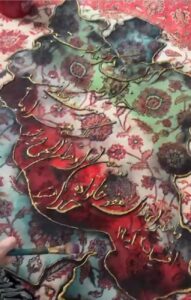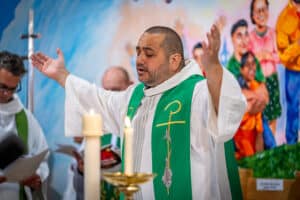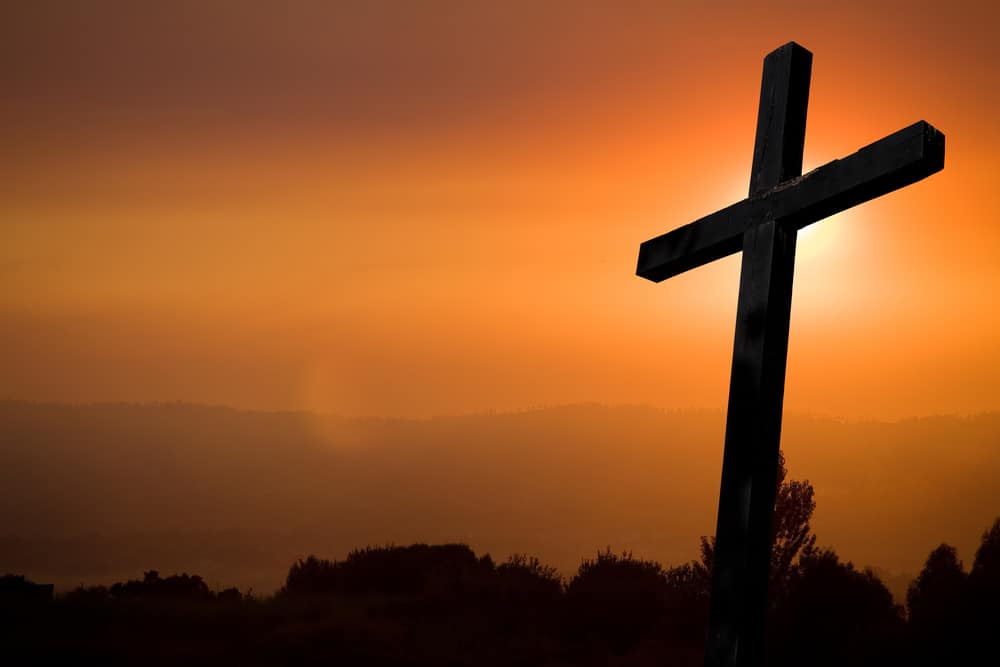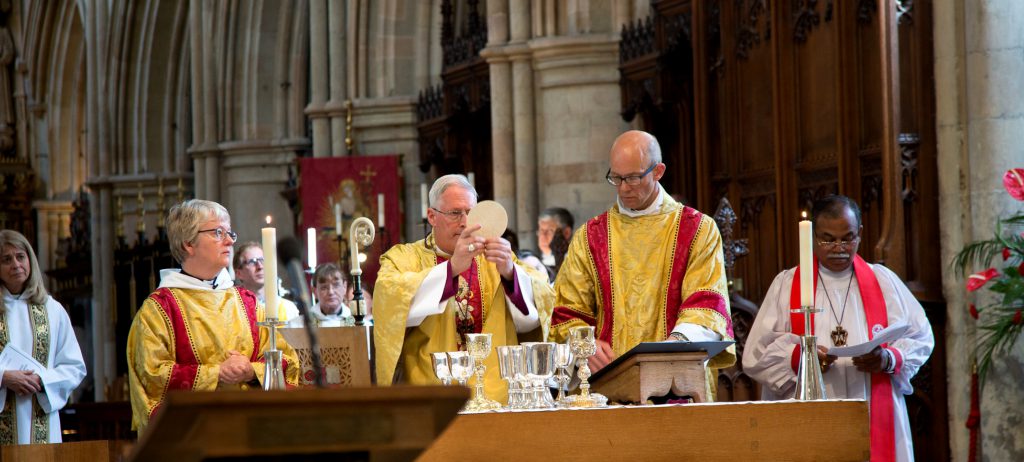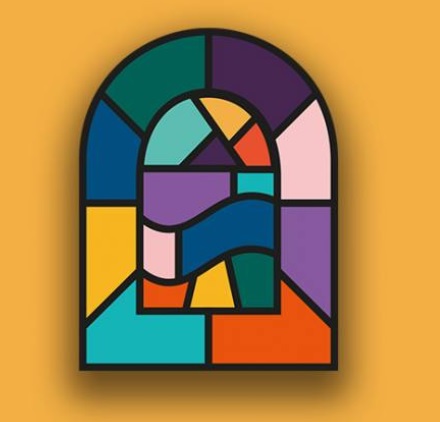Bishop Christopher’s keynote address at the Stories of Welcome launch reception at Farm Street Church for World Refugee Day 2022
It is a privilege to be here together on this first day of Refugee Week and I am grateful to Fr Dominic for his words of welcome. Thank you Maimuna for your very moving and powerful testimony. ‘All you have to do is want to welcome someone and to do something for them’. What a wonderful way to finish one of this striking set of stories which we have just watched. I was fortunate enough to be able to watch these films in advance, and something that stood out for me is how similar these stories are, as well as the wider stories that the team have gathered across our three Dioceses. There are many differences across the churches represented here: differences of denomination, style of worship, quality of dancing and singing(!), and we are from different parts of London – but the thread of welcome, and of showing God’s love, shines through all these stories and binds us together in a community of solidarity and hope.
The beautiful booklets which are being published tonight start with a thought-provoking line by the American author, and Roman Catholic, Donna Tartt: ‘Stories are sailcloths that we hoist to catch a breath of the divine’. It is no accident that deep truths are so often illustrated through stories, whether in the Old Testament or the parables of Jesus, the greatest storyteller of them all.
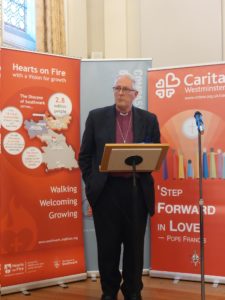
The stories which have been collected here have some very British features. Offering a cup of tea as a token of welcome is a motif which recurs frequently, and, in a moment of cultural connection, the British ‘coffee morning’ in the story of St Dunstan’s Primary School in Cheam is translated into Cantonese as a ‘tea gathering’ so that parents newly arrived from Hong Kong understand that it is a social gathering where the talking is more important than the drinks.
And these stories of welcome are so much more than words and pictures on a page or a screen. Every single story speaks of hearts that are open to the poor, the lonely and the vulnerable; hearts that rejoice in helping and welcoming, and hearts which are refreshed and renewed by loving service and unexpected blessings of friendship and connection.
I want to thank especially tonight those who have generously shared their stories of arriving in the UK. It takes great courage to share a story of adversity with dignity, and it is a privilege to hear and learn from those stories tonight.
The event tonight has two purposes. The first is to celebrate these stories of welcome, to notice and acknowledge how they reflect our churches as places where God’s love abides. St Teresa of Avila said, ‘Christ has no body now on earth but yours, no hands but yours, no feet but yours’. The volunteers shown in these films, and many other unnamed and unnoticed volunteers from our Dioceses, are living that out in a very real way as they welcome and serve people from all over the world. And in turn, they are granted that transformative power of an encounter with Jesus, who said ‘I was a stranger and you welcomed me’.
Every time we welcome someone into our country, our church communities, our homes and our lives – we are welcoming Christ.
This encounter looks different in different places, and the second purpose of tonight’s event is to show that everyone can be part of a story of welcome. In the videos people speak about making ‘small gestures’, about offering a ‘smiling friendly face’. Fr Keith Barltrop speaks about ‘finding small gestures’ like a vase of flowers, and The Revd Linda Fox spells it out: ‘It’s nothing that requires great skill but it’s about seeing a person to whom you are connected’. That is, the only skill required to welcome is that of wanting to welcome, of looking at each person as an individual, and finding Christ in that individual. If you seek to do that, you can provide a welcome.
Sadly, the UK today is not always a place of welcome. Too often there is a requirement to distinguish between people on the basis of their legal status, leading to wildly different support being available for people depending on where they have come from and how they got here. The Nationality and Borders Act, which became law earlier this year, sadly enshrines these distinctions in our legal system, making provision for some people to arrive safely and with dignity as resettled refugees, while others are left to make the dangerous journey across the English channel in inflatable boats, only to be housed for months in hotel rooms, not allowed to work while awaiting a decision on their cases. This is not the compassion that we expect to see from our elected Government, a Government which repeatedly talks about our ‘proud history of welcome’.
With my fellow Bishops in the House of Lords, last week I signed a letter calling on the Government to end the policy of deporting asylum seekers to Rwanda. I thank God that the flight last week was cancelled – as yet no-one has been transported – but the Government remains determined to pursue this course of action. As my fellow Bishops and I wrote in that letter, ‘our Christian heritage should inspire us to treat asylum seekers with compassion, fairness and justice, as we have for centuries … they are the vulnerable that the Old Testament calls us to value….we cannot outsource our ethical responsibilities …. Departures are not the way’. And this is not about Rwanda. Rwanda is hosting the Commonwealth Heads of Government Meeting in the coming days and I welcome the words of the Archbishop of Rwanda about his country being ready and willing to take in refugees.
No it is not about Rwanda but rather our moral duty in this country to take responsibility for those people who arrive on our shores as refugees and asylum seekers.
By contrast, what is happening in the churches that we are celebrating tonight is the very opposite of this. Instead of outsourcing responsibility everyone here is embracing it, and with it embracing those very asylum seekers that the Government is seeking to send away. There is a much better story to tell. We are already welcoming arrivals in significant numbers from Hong Kong and people in each and every community up and down the land have been queuing up to welcome refugees from Ukraine and other troubled parts of the world.
For those of us with privilege, whether that is privilege of British nationality, or race, or education, or status, it is essential that we speak out for the rights of those who are not as privileged. As the great philosopher John Stuart Mill said in 1867, ‘Bad men need nothing more to compass their ends, than that good men should look on and do nothing.’ Allowing for the gendered language of the mid-nineteenth century, this is still true today. It is essential that we do not accept an erosion of hospitality and welcome in this country. Addressing the narrative of fear and insularity, in letters to MPs, conversations in the pub, and of course prayer, both public and private, are all part of the advocacy that is our responsibility if we want to be counted as ‘good men’ or in other more contemporary words, women and men of goodwill.
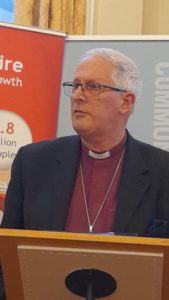
And so I want to close by saying well done, and thank you. Thank you to every one of you who is working to tell positive stories. If you are new to our country, you are welcome, and thank you for being part of our communities and sharing your stories. If you are a host or a welcomer, thank you for the work you are doing to show Christ’s love and welcome to our brothers and sisters.
Now I am going to hand over to Nicola Thomas, my colleague in the Anglican Diocese of Southwark, to tell you about the resources that are being launched tonight.





